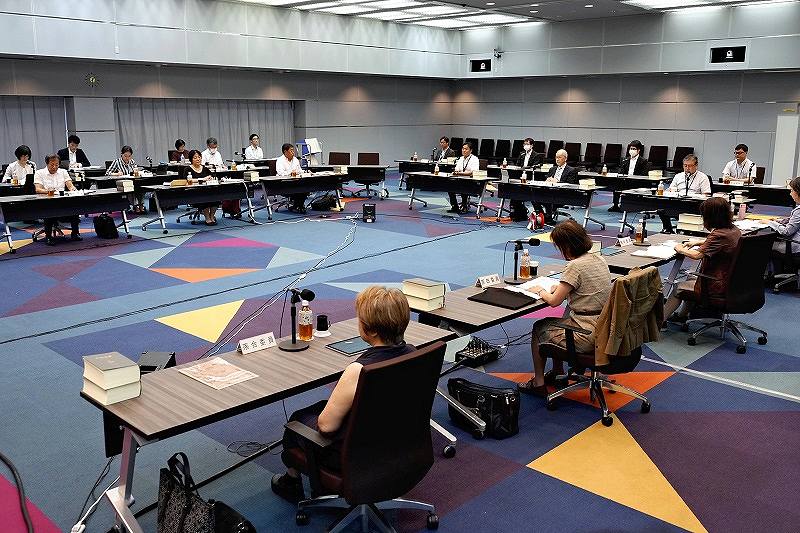Draft Calls for Joint Custody in Japanese Divorces; Sole-Custody Law Makes Japan an International Outlier

A Legislative Council subcommittee meets in Chiyoda Ward, Tokyo, on Tuesday afternoon.
6:00 JST, August 31, 2023
Aiming to introduce a joint custody system under which divorced parents would be able to share parental authority, the Justice Ministry on Tuesday presented a draft to be used as the basis for discussions on the amendment of the Civil Code to a subcommittee of the Legislative Council, an advisory body to the justice minister.
The draft makes clear that divorced parents are to be given the option of sharing custody of their children on basis of mutual consent. It also posits a system in which consideration is given to the victims of abuse or domestic violence.
Responsibilities
The introduction of a joint custody system was presented based on the principle that parents should respect each other’s personalities, regardless of whether they are married, in order to fulfill their responsibilities to their children.
The current Civil Code stipulates that married parents have shared custody of their children, but that after divorce, only one parent will exercise parental rights.
The subcommittee began discussions on reviewing the sole custody rule after then Justice Minister Yoko Kamikawa asked the Legislative Council to do so in February 2021 in light of problems such as nonpayment of child support and blockage of communications between children and their noncustodial parents.
The Legislative Council will compile its own draft outline by as early as the end of this fiscal year and submit a proposal to the justice minister. The ministry is considering submitting a bill to revise the Civil Code and other related laws to the ordinary Diet session next year.
The draft states that divorced parents can share custody of their children, based on their mutual consent. It also says that when divorced parents cannot agree on the terms of custody of their children, family courts will decide whether they will have joint or sole custody, considering the relationship between the two parents as well as between the parents and their children.
Court statistics for 2022 show that more than 90% of divorced mothers won sole custody of their children after divorce-related adjudication or mediation.
“If joint custody is granted, I may be able to get involved in my children’s education and other matters. It would be a step forward,” said a man in his 40s living in Tokyo. His wife suddenly left him two years ago with their three daughters, he said.
Factoring in abuse
There is strong opposition to joint custody on the grounds that domestic violence and other forms of abuse might continue even after divorce. In the public comments received by the ministry by February, about two-thirds of individuals opposed joint custody.
The draft says that sole custody should be respected if one parent was found to have engaged in domestic violence or other abuse. This is because the ministry aims to remove as much as possible any harmful effects of joint custody, taking critical voices into account, according to a senior ministry official. It also states that a family court should be able to reassign custody at its discretion if a parent is found to have engaged in violence or coercion in relation to the original custody decision.
Currently, parents cannot divorce without deciding who will have custody of their children. To prevent forced agreements on joint custody through domestic violence, the draft also includes a proposal to separate the issue of custody from divorce proceedings by allowing family courts to decide who will have custody of children afterward.
Criticism from abroad
In other countries, joint custody is the mainstream approach. According to a ministry survey conducted in 2020, India and Turkey were only countries where sole custody was the only option among a group of 24 leading countries, including the United States, Britain and Germany.
Recently, cases of foreign nationals who claim that their children have been abducted by their current or former Japanese spouses following the breakdown of their marriages have become a problematic issue.
In July 2020, the European Parliament criticized Japan by name, saying it was concerned about the high number of child abductions by Japanese people. Growing criticism over Japan’s sole-custody stance overseas has also encouraged debate over the introduction of a joint custody system in Japan.
France and Italy advocate joint custody as a general rule, but allow sole custody in cases where courts determine joint custody is not in the best interest of children as it invites the risk of abuse or other problems. This is believed to have served as a basis for the draft in Japan.
Top Articles in Politics
-

LDP Wins Historic Landslide Victory
-

LDP Wins Landslide Victory, Secures Single-party Majority; Ruling Coalition with JIP Poised to Secure Over 300 seats (UPDATE 1)
-

CRA Leadership Election Will Center on Party Rebuilding; Lower House Defeat Leaves Divisions among Former CDPJ, Komeito Members
-

Japan Tourism Agency Calls for Strengthening Measures Against Overtourism
-

Voters Using AI to Choose Candidates in Japan’s Upcoming General Election; ChatGPT, Other AI Services Found Providing Incorrect Information
JN ACCESS RANKING
-

Japan Institute to Use Domestic Commercial Optical Lattice Clock to Set Japan Standard Time
-

Israeli Ambassador to Japan Speaks about Japan’s Role in the Reconstruction of Gaza
-

Man Infected with Measles May Have Come in Contact with Many People in Tokyo, Went to Store, Restaurant Around When Symptoms Emerged
-

Prudential Life Insurance Plans to Fully Compensate for Damages Caused by Fraudulent Actions Without Waiting for Third-Party Committee Review
-

Woman with Measles Visited Hospital in Tokyo Multiple Times Before Being Diagnosed with Disease

























